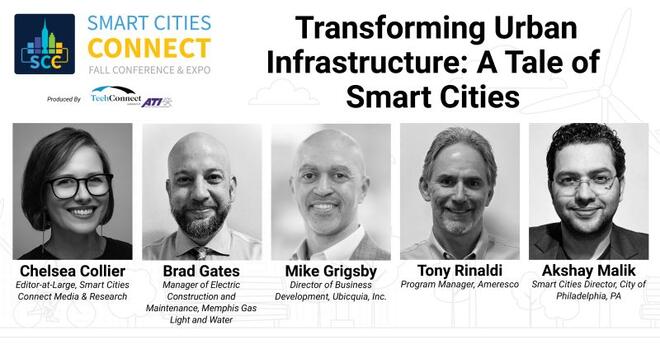Smart Cities Connect 2023: Smart Streetlights Provide IoT Entry Point

StateTech
Internet of Things sensors can gather data to improve public safety, experts say.
Smart city projects in Memphis, Tenn., and in Philadelphia demonstrate the potential of smart streetlights not just for illuminating neighborhoods but also for collecting data that can improve the lives of citizens in other areas, agreed an expert panel at Smart Cities Connect 2023 on Tuesday.
Addressing the conference in National Harbor, Md., Mike Grigsby, director of business development for Ubicquia, said that replacing traditional streetlights with smart LED lights paid dividends.
“We make a streetlight a smart asset once we layer advanced technology on top of it, providing intelligence on what is happening with the light itself ... but also about the surrounding environment as well,” he said.
So, the city gains insight into the condition of the actual light and pole, and it also can use the networked node to gather intelligence. Internet of Things sensors on smart streetlights could include pedestrian counters, vehicle counters, license plate readers, video surveillance cameras and air quality monitors, Grigsby said. The light poles also can carry routers, switches and other equipment that supports public Wi-Fi, he added.
Smart streetlights create tens of thousands of nodes across a city landscape. Officials can use these smart assets to gather data that they did not previously have, Grigsby said. Cities can use that intelligence to enhance public safety and citizen engagement. “You have an entry point into the smart city space at scale,” he said.
Memphis and Philadelphia Embrace Smart City Goals
Brad Gates, manager of electric construction and maintenance for Memphis Light, Gas and Water, said smart streetlights provide energy and maintenance savings. Memphis’s LED lights last for 23 years, so they do not require frequent replacement. “Smart nodes let us know when lights are out, so customers don’t have to report outages,” Gates said.
Gates estimated that the Memphis LED Streetlight Conversion Project, to be completed in December, will replace nearly 80,000 streetlights. The city funded the project with a streetlight fee billed to its citizens.
Because the smart streetlights produce savings and help deter crime, the Memphis project won immediate and broad support from all levels of government when it was initially proposed, Gates said.
In Philadelphia, the Philadelphia Streetlight Improvement Project upgrades roughly 140,000 streetlights, said Tony Rinaldi, program manager at Ameresco. Philadelphia lists the benefits of the project as improving public safety, increasing energy conservation, enhancing operational efficiencies and establishing a communications network.
“Philadelphia began its smart streetlight project with the idea that a smart city was the end goal,” Rinaldi told the panel.
Philadelphia Energy Authority issued a $90 million bond to fund the project, which will last for two more years.
Philadelphia Smart Cities Director Akshay Malik was scheduled to participate on the panel, but his arrival at the conference was delayed.
Read the original article here.

